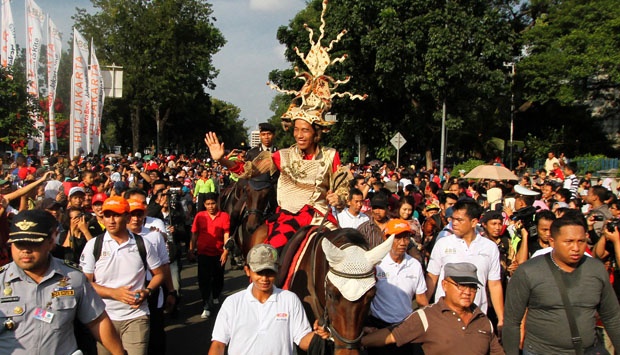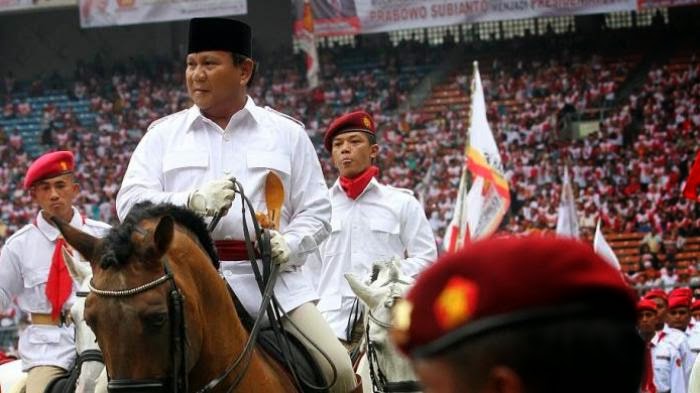
Born of a system of oligarchy, Jokowi has manoeuvred the political process with his integrity intact. Photo credit: tempo.co.id
It now seems fairly certain that Joko Widodo has won the 2014 Presidential elections in Indonesia although his rival, Prabowo Subianto, has so far rejected the results of the early exit polls. What can we expect from a Jokowi Presidency and will he really usher in a new era for Indonesia? How would a Jokowi presidency differ from a Prabowo presidency?
Much of the concern in Australia has been focused on whether a new president would introduce a more nationalistic stance that could constrain trade and investment and exacerbate tensions in areas like asylum seekers and live cattle exports.
It is true that both candidates have made vague appeals to nationalist sentiment during the campaign. But such rhetoric has always been part of Indonesian politics and this is not unique to Indonesia. Neither of these could sustain a nationalist agenda in any systematic manner because of the political and economic interests that are pervasive in Indonesia itself and the way Indonesia has already integrated with the global economy.
This is why the key question is how the new President will deal with the powerful interests that shape Indonesian politics and its economy as well as tackling entrenched corruption and political dysfunction. At a time of broad disillusionment across Indonesia society with the way democracy has evolved, both candidates are seen by their supporters to offer a way out.
However, neither Prabowo nor Jokowi represent a fundamental break with the past and neither possesses the resources to fully deliver on their rhetoric. Both have to operate within a powerful and complex system of oligarchy that enmeshes political authority and private wealth.
The appeal of Prabowo was that he offered a return to the certainty and decisiveness that many feel have disappeared from Indonesia’s institutions of political and economic governance.
Prabowo has extolled the Singapore model as a vision for Indonesia’s future. But this was never a real option. There is neither the sophisticated technocratic apparatus nor the disciplined one-party structure to support this. What we would have seen under Prabowo was a return to a more centralised, state directed oligarchy in the style of the former Soeharto era. After all, it is within the heart of oligarchy itself that Prabowo’s power is to be found.
We could have expected Prabowo to concentrate on the task of reshaping oligarchy rather than dismantling it by concentrating power and privilege in the hands of his allies and supporters. Ironically, this could have unleashed instability within the oligarchy itself as different interests struggled to maintain their privileges.
In this journey Prabowo would have confronted a parliament that is fractious and not easily cajoled as well as local elites used to enjoying the privileges accorded to them by a free-wheeling decentralised democracy. And there was never any certainty that Prabowo ever exerted control over the military.
His appeal to populist sentiment of both nationalist and Islamic varieties and his rhetoric about empowering the poor, including vague promises to distribute new land to peasants was calculated to build a large base of popular support to counter opponents within the oligarchy itself. This is a populist option adopted by many leaders elsewhere, including Thailand’s Thaksin, to outflank opposition from competing elites.
On the other hand, Jokowi is presented as a newcomer untouched by corruption scandals; a person from the provincial lower middle classes without the baggage of the Soeharto era and with a proven ability to communicate with the poor and the middle classes and to get things done, at least at the city level. It was this outsider status that accounted for his earlier wildly high levels of popularity.
Nevertheless, Jokowi is also embedded in the system of oligarchy even if he does not hail from a powerful oligarchic family. A local businessman from the Central Javanese city of Solo, he is a beneficiary of the very system of chaotic and decentralised electoral democracy that has defined Indonesian politics since the fall of Soeharto.
Belying his public persona as a ‘man of the people’, he has displayed considerable acumen in negotiating within established elite structures. In his short political career he has successfully negotiated deals with Gerindra, the PDI-P and with old political war horses like Megawati and Jusuf Kalla. What is unique about Jokowi is that he has managed to do this with his reputation for integrity relatively intact.
However, he does not command the support and resources of powerful sections of the oligarchy. This means that he keep the power of oligarchs as fluid and diffuse as possible to allow him to negotiate loose and shifting alliances as the basis of his government. His interest will be to maintain the system of power that facilitated his rise.
This means that his very alliance with the PDI-P may become an important liability. Although he is the candidate of that party, its support has been only grudgingly given by the grandees of the Sukarno family. One probable consequence of this is that Jokowi will find himself besieged by the demands of a family eager to maintain their authority over the party and to secure their share of the spoils, including key Ministries in the new government for their acolytes.
In these sorts of struggles, his only real bargaining chip is his popularity. So we can expect a continuation of his strategies in Solo and Jakarta to broaden access to social services, overcome bureaucratic inertia and build public infrastructure. He will have to be the action man who is seen to get things done. In other words, his political support will depend on him successfully tackling concrete problems that matter to the disgruntled middle classes and the poor alike: traffic congestion and flooding, urban renewal and urban planning as well as stimulating growth and innovation in the agricultural sector. These are all problems that have been neglected by previous governments.
Interestingly, Jokowi has often been compared – by his supporters – to Obama, another relative political outsider with big reformist plans. Like Obama, Jokowi will find his reforms resisted by entrenched interests, including, as mentioned above, allies within his own party that will seek to expropriate his reform agenda and the opportunities they offer for private accumulation. One of the risks he will face is that, like Obama, the expectations of his supporters will be too high.
Vedi Hadiz is Professor of Asian Societies and Politics at Murdoch University and an Australian Research Council Future Fellow.
Richard Robison is currently Emeritus Professor in the Asia Research Centre at Murdoch University.
 Facebook
Facebook  Twitter
Twitter  Soundcloud
Soundcloud  Youtube
Youtube  Rss
Rss 